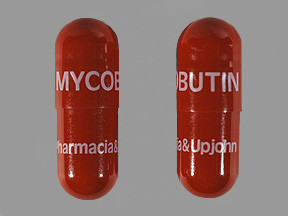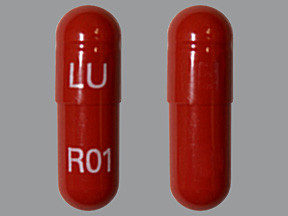RIFABUTIN - ORAL
PHONETIC PRONUNCIATION: (rye-fuh-BYOU-tin)
COMMON BRAND NAME(S): Mycobutin
GENERIC NAME(S): rifabutin
Uses
USES: This medication is used alone or with another medication to help prevent a certain serious infection (Mycobacterium avium complex-MAC). Rifabutin is known as a rifamycin antibiotic. It works by stopping the growth of bacteria. This antibiotic treats and prevents only bacterial infections. It will not work for viral infections (such as common cold, flu). Using any antibiotic when it is not needed can cause it to not work for future infections.
How to use RIFABUTIN - ORAL
HOW TO USE: Take this medication by mouth with or without food, usually once or twice daily or as directed by your doctor. Take this medication with food if stomach upset occurs. For the treatment of tuberculosis, this drug is sometimes taken twice weekly. Dosage is based on your medical condition, weight, interacting drugs, and response to treatment. For the best effect, take this antibiotic at evenly spaced times. To help you remember, take this medication at the same time(s) every day. Continue to take this medication until the full prescribed amount is finished, even if symptoms disappear. Stopping the medication too early or skipping doses may allow the bacteria to continue to grow, which may result in a return of the infection and cause the infection to be more difficult to treat (resistant). Tell your doctor if your condition persists or worsens.
Side Effects
Precautions
Interactions
Overdose
Images

- color
- red-brown
- shape
- oblong
- imprint
- MYCOBUTIN, PHARMACIA & UPJOHN

- color
- red-brown
- shape
- oblong
- imprint
- MYCOBUTIN, Pharmacia

- color
- red-brown
- shape
- oblong
- imprint
- MYCOBUTIN, PHARMACIA & UPJOHN

- color
- red-brown
- shape
- oblong
- imprint
- MYCOBUTIN, PHARMACIA & UPJOHN

- color
- red-brown
- shape
- oblong
- imprint
- MYCOBUTIN, PHARMACIA & UPJOHN
Reviews
Faq for RIFABUTIN - ORAL
Rifabutin is an oral medication used to prevent and treat certain bacterial infections, including tuberculosis (TB) and Mycobacterium avium complex (MAC) in people with a weakened immune system, such as those with HIV/AIDS.
Rifabutin belongs to the class of antibiotics called rifamycins. It works by inhibiting the growth and replication of bacteria, specifically by blocking the activity of an enzyme called RNA polymerase, which is essential for bacterial DNA synthesis.
Rifabutin is usually taken once daily with a full glass of water, either with or without food. It is important to follow the prescribed dosage and duration of treatment recommended by your doctor.
Common side effects of rifabutin may include nausea, vomiting, stomach pain, diarrhea, difficulty sleeping, headache, dizziness, or rash. It is important to inform your doctor if these side effects become severe or persistent.
Yes, rifabutin can interact with several medications, including HIV protease inhibitors, certain antifungal drugs, corticosteroids, blood thinners, and others. It is crucial to inform your doctor or pharmacist about all the medications you are currently taking to avoid potential drug interactions.
The duration of rifabutin treatment depends on the specific condition being treated. For tuberculosis, treatment typically lasts for several months, while treatment for MAC infection may require lifelong therapy. It is important to complete the full course of treatment as prescribed by your doctor.
Rifabutin should only be used during pregnancy if the potential benefits outweigh the risks. It can pass into breast milk, so it is important to consult with your doctor before taking rifabutin while breastfeeding.
If you miss a dose of rifabutin, take it as soon as you remember. However, if it is close to the time for your next scheduled dose, skip the missed dose and resume your regular dosing schedule. Do not take a double dose to make up for a missed one.
Although rare, rifabutin can cause serious side effects such as severe allergic reactions, liver problems, anemia, or changes in vision. If you experience any unusual or severe symptoms while taking rifabutin, seek immediate medical attention.
Disclaimer
IMPORTANT: HOW TO USE THIS INFORMATION: This is a summary and does NOT have all possible information about this product. This information does not assure that this product is safe, effective, or appropriate for you. This information is not individual medical advice and does not substitute for the advice of your health care professional. Always ask your health care professional for complete information about this product and your specific health needs.

No Reviews Yet